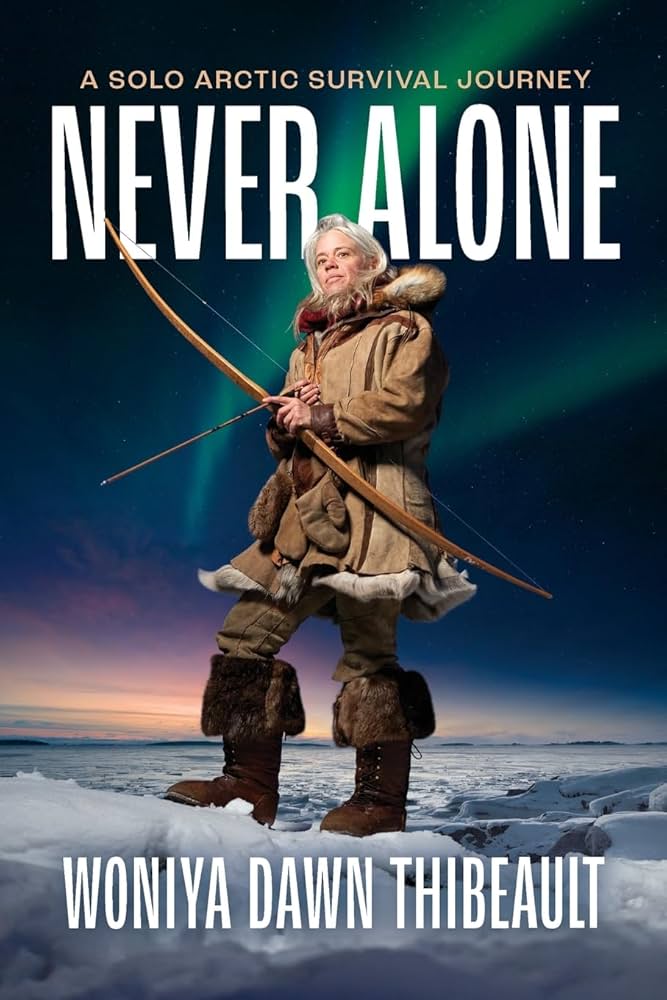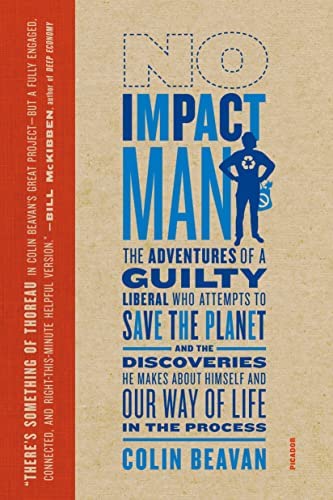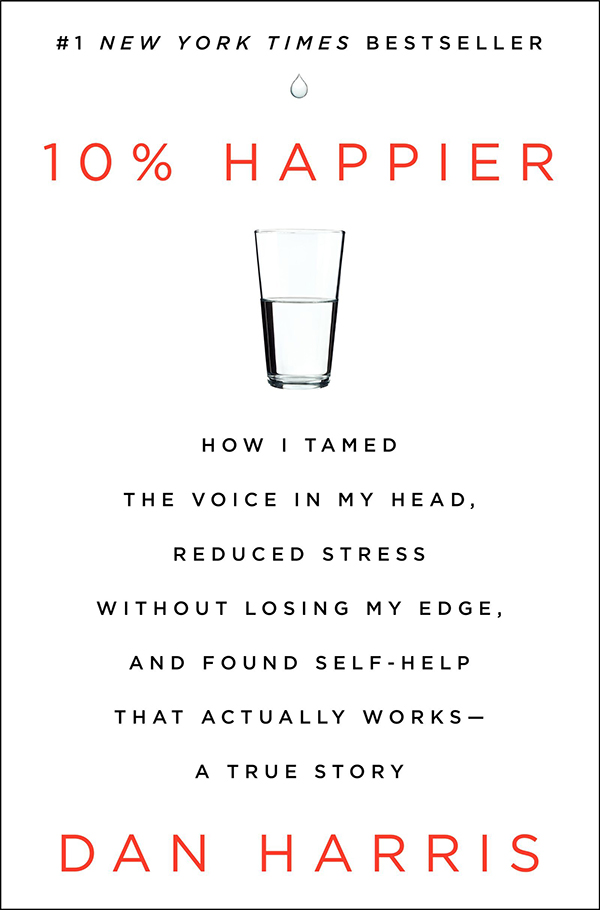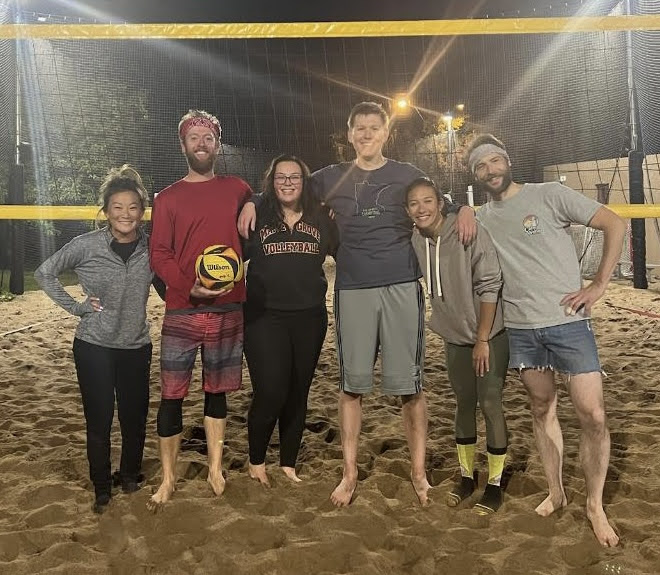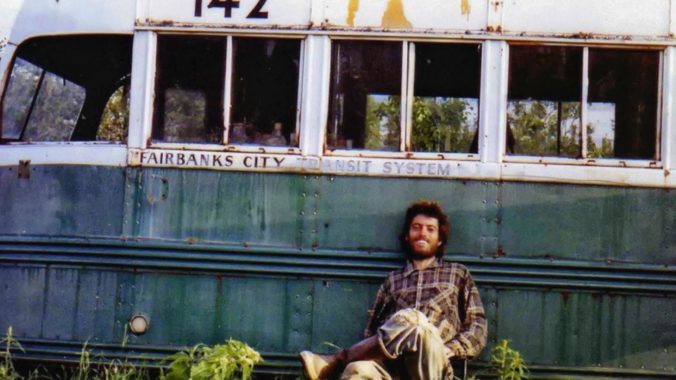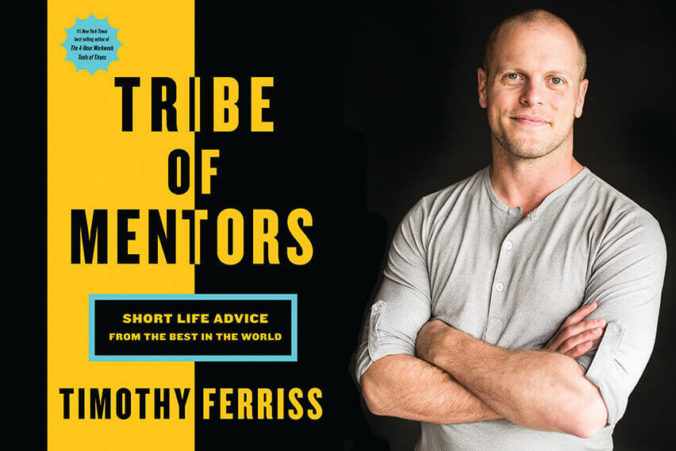Here are some shortcuts to Woniya’s Top Five Most Potent Offerings from her book Never Alone.
- We can live on more than physical sustenance; we can also be nourished by beauty and by finding awe and wonder in whatever life offers.
- The importance of ritual, animism, and acknowledging one’s ancestors.
- The right way to do things is your way.
- Social commentary on femininity, body shapes, food culture (both modern and ancient), capitalism
- Trusting in the universe and practicing magic
INTRODUCTION
History Channel’s “Alone” might just be my favorite television show of all time. It’s the closest thing to actual reality television on the planet. Ten wilderness survival experts from various lineages and locations are each dropped off at a designated site in a remote location. Alone. They have a minimal supply of survival gear and camera equipment to record themselves. No camera crew. No production staff. The person that lasts the longest in the woods wins a grand prize of $500,000 cash.
On season six of “Alone,” Woniya Thibeault nearly won the grand prize, but became the runner up when she used the emergency satellite phone to “tap out.” Even though she did not win the season, she won the hearts of many in the audience, including me. It was her approach, her philosophy, and her deep, full mind-body connection to nature that was so palpable and inspiring to watch.
In 2023 Thibeault published a book titled Never Alone, which walks the reader through her lived experience preparing for and “surthriving” in the Northwest Territories of Canada, as well as her post-show reentry into society and her reflections of the entire journey.
Of the copious wisdom and insights provided in this delightful page-turner, five themes emerge as Woniya’s most insightful and powerful gifts to us all. Here they are.
WONIYA’S TOP FIVE MOST POTENT OFFERINGS FROM NEVER ALONE
1. We can live on more than physical sustenance; we can also be nourished by beauty and by finding awe and wonder in whatever life offers.
When most of us think about surviving out in the wild, we envision prioritizing the basics–water, shelter, food. If we’re thriving so well that we get all those boxes thoroughly checked, then maybe we’d progress to focusing on comfort, convenience, making life a little easier on ourselves. But that’s a big “if.” Most of the wilderness survival experts throughout all the seasons of “Alone” never make it past the stage of constructing a long-term shelter and generating a reliable supply of food.
Woniya’s approach was different. Yes, she was strategic about her shelter location and attempted multiple active and passive food procuring methods. But she also took time to notice the colors in the sunset. She kept note of the days of her stay that were prime numbers; in actuality it didn’t have any material significance, yet to her, she made it a thing. Rather, she allowed it to be a thing.
What to others would be a distraction, a waste of energy, is actually a source of energy for her.
Woniya herself even says in the book, “we can be nourished by a lot of things.”
2. The importance of ritual, animism, and acknowledging one’s ancestors
If you’ve watched “Alone,” you know that one of the primary ways contestants leave the show is neither lack of food nor physical injury or ailment–they choose to leave because they feel, well, alone. Many skilled, well-prepared bushfolk “tap out” on the show because they miss their loved ones, they realize their priority is to be at home, or because they just can’t take being away from any human contact any longer.
Human beings are (one of if not) the most social creatures on the planet. So, it takes not only a skilled survivalist but also someone who can handle being alone to go far on the show.
Woniya’s answer to curing and preventing loneliness woes? Treating the life and elements around her–the plants, the birds, the squirrels, the berries, the water, the sun–as allies, as companions. Her animistic instincts allowed Woniya to experience the feelings of closeness and kinship that many humans only feel when in the company of other humans.
She would often make a ceremony out of honoring the animal she’d skilled or the tree she was about to chop down. One of her most profound rituals was continuing to offer ancestor plates long into her stay in the wild; despite operating at a vast caloric deficit, when food would finally make its way to her pot, instead of scarfing it all down she would slow down, savor every morsel, delight in every ounce of nourishment, and, most inspiringly, offer a small portion of her precious calories to her ancestors. Despite severe hunger pangs and living in a body desperately craving physical sustenance, by honoring her ancestors she also invoked their presence and so had more allies and support nearby. She was not alone. Some might say she strengthened her karma with this practice, which then led to successfully trapping the next hare.
In the book she relates how the COVID-19 pandemic gave everyone a taste of “illustrat(ing) why mastering the skills to provide for our own needs from the resources right around us is not a relic of the past but a real and present need. They aren’t just ancestral ways; they are timeless ways.”
So her magic was animism, ritual, ancestral connection, selflessness, and also… dance parties. Yes, wilderness survival dance parties. Woniya threw herself a weekly dance party in the Arctic wilderness while trying to survive all by herself. Who says you need to have more than one person for a dance party? Who says you need to have any music other than what’s available in your mind? Who says you shouldn’t be “wasting” your energy dancing in a survival situation when you could be fortifying your shelter or procuring food?
In the end of her “Alone” journey, after all of the rituals and ceremonies and ancestor plates offered, Woniya winds up embodying the feeling not just of being deeply connected to her ancestors but of being an ancestor herself. She truly embodies this feeling, realizing her unending connection to the past, the present, and the future, all at once.
This moving conclusion illustrates the power of her practices.
3. The Right Way To Do Things Is Your Way
Woniya faced enormous pressure to conform. With a $500,000 prize on the line, contestants on “Alone” understandably give great thought and care into what limited items of gear they will bring with them into the wilderness.
While virtually all other participants on “Alone” invest in state-of-the-art technical outdoor gear, Woniya chose to make her own clothing. Her own clothing. To be the sole materials to stand between her body and the elements above the Arctic circle for more than ten weeks! She ingeniously knitted an oversized sweater fastened with buttons made of salt to have extra sodium as well as extra fibrous material and cordage available. She crafted at a feverish pace in the days leading up to the filming of the show to finish in time, and even then she had to bring a few pieces in her luggage that were only partially finished. But it isn’t just her creative ingenuity nor her dedicated work ethic that makes her decision to make her own clothes so special–it’s that she went against the mainstream methods and had confidence that the way she knows was the best way.
She continued with this mindset at production base camp where, after arriving and assessing the other participants, felt like she was clearly the “weird one” of the group (due to being the only one knitting a sweater for the show while listening to a lecture in one of their training sessions). But she didn’t mind being the weird one. She believed in her way of doing things.
This quality reared its head dramatically at the end of her stint on “Alone” when Woniya decided it was time for her to tap out and go home. Her time by Tu Nedhé (colonially known as Great Slave Lake) was over. She had been fearing that the production staff would remove her during a routine medical check due to her physical condition, and while she passed the exam, she had a feeling that the next med check could be her last. And so, rather than push her body past its natural limits, potentially impacting her physical health for the rest of her life, she chose to leave on her terms, forgoing the chance to win a half a million dollars in exchange for integrity, a belief in herself, and an acknowledgment that she had already given and received everything she needed in her time in the Arctic.
4. Social commentary on femininity, body shapes, food culture (both modern and ancient), capitalism
Never Alone is such a wonderful read in part because Woniya not only chronicles her experiences before, during, and after the show, but also she tells stories from her past which illuminate the wholeness of who she is.
At a time in her life, she was very opposed to anything overly feminine–glitzy jewelry, makeup, high heels, that sort of thing. Her strong feminist beliefs guided her to avoid and resent anything that the patriarchal world might reward for being some sort of archetypal, societally approved ideal woman (whatever that means). But by the time of her experience on “Alone,” her relationship with femininity had evolved. In one particularly jubilant lakeside dance party, she had transformed her scarf into a skirt and, despite the frigid Arctic temperatures, she insisted on wearing it, not out of some cultural obligation but because she wanted to genuinely celebrate sacred feminine energy, the energy that brought her to that point, the energy she channels in her softer, slower, more spiritual approach to life in the outdoors.
Another potent moment hit when Woniya was returning home and traveling through airport security. After a brief conversational exchange when Woniya mentioned to the security guard that she had just been in the wilderness and had lost a dangerous amount of weight, the guard replied “congratulations” to her weight loss. Woniya reflected, “Having just emerged from the most potent, extreme, and beautiful experience of my life, I’m both confounded and horrified by our society. My experience in the Arctic lifted a veil, revealing the fabricated reality we have built for ourselves and the damage it inflicts. Almost no one I have ever interacted with in the ‘real world’ actually understands the reality of survival or the true meaning of food. Congratulations for almost achieving total starvation? What is wrong with you people?”
As one might imagine after needing to nourish herself for weeks in the wild, Woniya’s perspective on food shifted. Literally every scrap of sustenance she consumed for 73 days was sourced from the wild. Not from the corner store. Not from a garden. Not from a refrigerator. Not even from a neighbor. One would see food from a new viewpoint after going through an experience like that, a perspective with more clarity, more significance, less influence from the modern world, perhaps even more… truth.
During her first days reintegrating back into the modern world, while she was in the checkout lane to buy greens at Safeway (because the co-op was closed), Woniya thought, “I’ve just come from the wilderness, where lack of food was slowly killing me. Now I’m surrounded by more calories than I could eat in my lifetime, and I’m absolutely horrified by it. All I can think is–this stuff is poison. It’s literally true. These calorie rich, nutrient poor, highly processed foods are the bane of our society. The vast majority of illnesses that so-called “civilized” people experience are due to overabundance of foods we were never meant to eat and lack of the daily activities and natural rhythms that characterized our ancestors’ lives. What would our world look like if we all knew the real value of food and gave our bodies only what would most nourish and fulfill us?”
Woniya concluded, “any day with food in it is a good day. Food is not something we are entitled to, and for most of human history, our ancestors had to work hard for it and often went with less than enough. Every time you sit down to a meal, remember to look at the food in front of you with tremendous gratitude, and know that you are, in fact, immensely wealthy.”
In the modern world, most of us rely on using the system of capitalism to make money to then spend on things that other people make. We make enormous trade-offs when participating in that system, trade-offs that affect not only our lives but the lives of others and the lives of future generations. Woniya’s unique viewpoint after having a survived for a few months outside of that system shines a light–”As long as humans require warmth, shelter, water, and food, our lives will depend on our ability to find them, and our credit cards won’t always be the answer. The beautiful thing is that this isn’t a liability–it’s an invitation to live a richer, more satisfying life that’s in tune with the cycles of the season and the natural world.”
5. Trusting in the universe and practicing magic
To survive in the wilderness for long, one must have a fairly deep understanding of science. The natural world often operates with predictable scientific systems. Plants and their effects on our bodies, the movement and behavioral patterns of animals, water purification, the cycles of sunlight, the tides, the combustion of wood… an adequate knowledge of the science behind these aspects of nature improves one’s ability to last longer in the outdoors.
These are things that can be studied. The science is documented. Books can be read. Workshops can be taken. The knowledge can be gained, all that one needs to apply is time.
There are other things that cannot be studied as much as they can be practiced.
More so than any other participant on “Alone,” Woniya believes and is connected to more than just animal tracking and shelter building. Woniya believes in magic.
One shining example of the type of magic Woniya practices came when she was building her shelter on season six. A particular tree was directly in the way of the place she wanted to expand her shelter. Rather than removing the tree, as most other survivalists would have done, Woniya quite literally asked the tree’s permission before cutting. And not only did she ask consent, but also she actually listened for and felt into an answer. While a previous similar tree had given her a clear ‘yes,’ she felt this one distinctly reply ‘no,’ so she inconvenienced herself to build around it. This would have been considered an “unwise” survival move because of the extra effort and calories it would use to build around this tree, not to mention the possibly “inferior” or “less ideal” shelter design, but time and time again her trust in her own intuition lead to magical events.
One such event was finding a tiny piece of metal in her cabin, which she repurposed into a valuable needle. This tiny piece of metal was found in the part of her cabin that would not have existed had she chopped down the tree that had spoken to her.
In two different instances she found arrows she had lost, and it was only because of preceding choices, moments of slowing down, of listening, and of connection that she had happened to be in those locations.
When she was preparing for the show and hustling to finish her clothing and packing, Woniya pushed it a little too close and ended up missing her flight to production check-in. At first, she was devastated, worried that she was compromising her chances at participating after all of this preparation. It turned out, however, to be a blessing because she would only miss the arrival day, the least important of all the pre-show days, and it gave her crucial extra hours to knit her unfinished pieces. So perhaps she didn’t push it too close and actually prepared in the exact way she needed to.
Does that kind of good fortune come from trust in the universe? From believing in magic? Is it luck? Coincidence? Does she create her own karma, manifest her own destiny?
Her openness to receiving what comes as a gift, as a sign, as magical does seem, as an objective observer, to lend credence to the argument that an openness to magic invites more magical moments into one’s life.
TAKEAWAY
Of everything Woniya shared about and demonstrated on her “Alone” journey, the thing that makes her stand out, the thing that makes her so memorable and unique, is her steadfast beliefs that things like connection, awe, and beauty are survival skills as equally important as knowing your knots, building a fire, and constructing your shelter.
This ancestral, holistic, spiritual, and more feminine approach to life in the wild is so striking because it seems counterintuitive to those who, like me, are steeped in modern western culture. How could dancing at sunset be just as or more crucial to survival above the Arctic circle than putting in extra time to build and insulate one’s shelter? How could toiling over making your own clothing be more beneficial than leveraging the advancements in manufacturing and textiles? How could giving away your precious food when you’re starving be a key to unlocking more time surviving alone?
Woniya’s life is all the proof we need to prove that all of these can be true.
MEMORABLE QUOTES FROM WONIYA’S FINAL REFLECTIONS
Here are a few words quoted directly from the end of Woniya’s book Never Alone when she’s condensing her key messages for the audience.
“There are few things as transformative as feeling seen and held by an intact wild place, merging with the natural world around you, and coming to see yourself not as separate but as an important and valued part of it–feeling a belonging so deep that there’s no such thing as loneliness.”
“When we listen deeply and engage with the world around us in a way that honors it and gives back, whether we’re in human company or not, we are, in fact, never alone.”
“We never know what we are capable of until it’s really all on the line. Rather than waiting for an experience [that pushes you as hard as I was pushed in the Arctic,] start believing now that you can achieve the staggering accomplishments of your wildest dreams.”
COMMENTS & REFLECTIONS
Are you a fan of Woniya Thibeault and the television show “Alone”?
What resonates with you about Woniya’s story?
Have you read other books, watched other shows, or know of other stories that followers of Woniya or “Alone” would enjoy?
Leave a comment and let us know!
